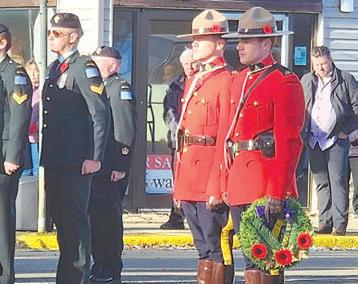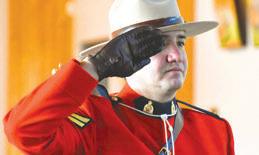
6 minute read
Remembrance Day Activities

Metis Crossing Hosts National Indigenous Veterans Day
Michelle Pinon - News Advertiser
Metis Crossing hosted a National Indigenous Veterans Day Ceremony on Nov. 8. Metis Crossing Chief Executive Officer Juanita Marois served as Mistress of Ceremonies and welcomed honoured guests and attendees to the event.
“It is very important for us to be celebrating National Indigenous Veterans Day here,” stated Marois. She pointed out that, “The role of Metis Crossing is to share and celebrate our story with all people and part of that comes before Canada as we know.” Marois touched on the Battle of Seven Oaks that she said was a result of the Pemmican Proclamation the Hudson Bay Company banning Metis from selling it to the Nor’Westers, resulting in the Massacre of Frog Plain.
“We now refer to it as a battle and it was a victory for Metis people. It was first time came together as a people and as nation.” She recited the famous poem ‘Chanson de la Grenouillere’ (Battle of Frog Plain) by Pierre Falcon.
Marois introduced Bernie Poitras, District 12 Captain of the Otipemisiwak Metis Government. A general election was held from Sept. 13-19, 2023. “I consider it a great honour for myself to recognize the Metis countries that are here today, and those Metis veterans and others who have paid the ultimate price to give us a free country. Thank you very much. My dad actually had two brothers that served in the First World War and my mother also had two brothers that served in the Second World War.
I’d like to welcome our elders here today who we are still learning from. Thank you veterans and to our elders. Thank you for a job well done. Thank you for the battles won. Thank you for the battles fought. And thank you for the freedom bought. Thank you for the time you served. Thank you for the freedom earned. And thank you veterans for sharing you. I’m sorry for the lives lost. Freedom does not come cheap. It comes at a very high cost. I love my freedom. I love my red maple leaf. So, thank you veterans for all you do.”
Metis Veteran Bruce Gordon was the featured guest speaker. He shared some of his memories and what it meant to be a veteran. I served Suez Crisis 1956-57 with the Royal Canadian Air Force.
“Generally, a veteran means you have served your country in some capacity and made sacrifices to do so. Being a military veteran means you sacrifice a number of years of your life for the privilege of obeying orders from those higher ranking than yourself.”
Gordon said it also meant conditioning and performing, seemingly endless number of sit ups, pushups, hiking and numerous other duties to condition yourself. “It also meant for those shooting ranges and field trips. We were willing to fight and die in service to this country.”
Being a veteran, added Gordon, meant being separated from friends and family, and giving up control of your life in service with great risk of life and permanent injury. “It meant you took an oath to defend and support your country at all costs. Veteran, a title earned through hard work and dedication to a cause greater than ourselves.”
Gordon said it is estimated that as many as 12,000 First Nations, Inuit and Metis served in two great wars and at least 500 died. Many earned medals for their bravery in battles on the front lines. Although they were equals on the battlefields, they were not equals at home. “Discrimination was prevalent after the wars.” He told of Indigenous soldiers who had served four years who were not considered Indians after returning home as statues dictated under the Indian Act. As a result, Gordon said, they could not re-enter their previous lives or receive benefits like other veterans. “Many were forced into despair and poverty.
He noted that, “They were not allowed to share toasts in honour of lost comrades until 1951 the Royal Canadian Legion, including on Remembrance Day.”
Prior to 1994, Indigenous soldiers were not permitted to participate in Remembrance Day ceremonies as a group or to lay wreaths. Indigenous veterans were only allowed to attend as an individual. It was not until 1995, fifty years after the Second World War that Indigenous peoples were allowed to lay wreaths at the National War Memorial.
Gordon said it is important to remember the past and by learning the lessons of history we can move towards a better future and create a more peaceful world.
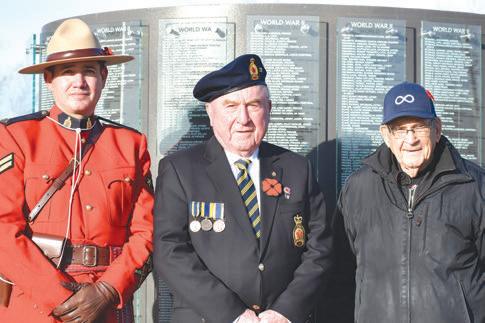
L-R: RCMP Cpl. Vernon Hagen, Bruce Gordon and Wilf Butlin. (Michelle Pinon/Photo)
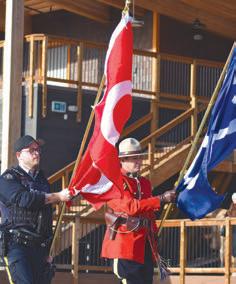
RCMP Cst. Lidstone, left, and Cpl. Hagen march to the monument. (Michelle Pinon/Photo)
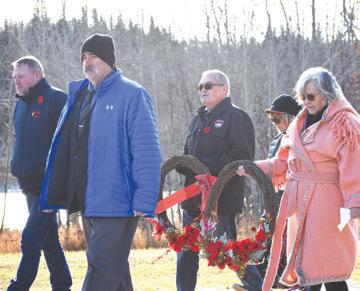
Procession towards the monument. (Michelle Pinon/Photo)

Village of Andrew Remembrance Day Ceremony
Village of Andrew - Submitted
Village of Andrew had approximately 175 people attend this year’s Remembrance Day Ceremony on Nov. 11. This included 25 members of our military based out of the Edmonton Garrison.
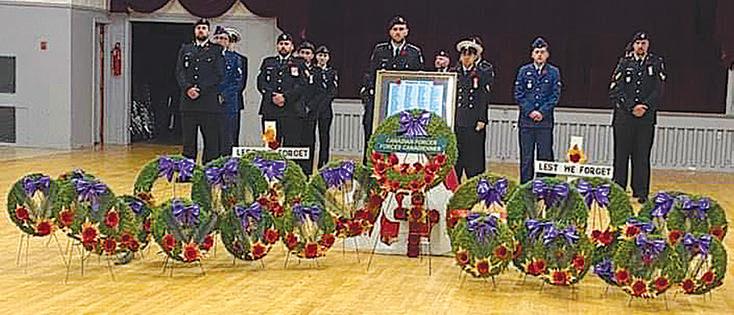
The weather was fantastic for this time of year. We marched from our Village office to the outdoor Cenotaph for the 11 am portion of the Ceremony. From there, we marched to the Community Centre where we did the full ceremony for our residents.
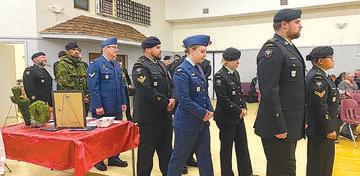
We had welcome messages by letter from our MP -Shannon Stubbs, and our MLA- Jackie Homeniuk/Armstrong. In person welcome messages from the Mayor Barry Goertz and County Councilor Roy Anaka.
Once again, our Lions Club donated and prepared the luncheon for our Soldiers and residents. This is something this amazing group has done for over 25 years.
